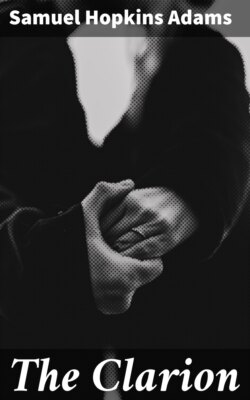Читать книгу The Clarion - Samuel Hopkins Adams - Страница 11
На сайте Литреса книга снята с продажи.
THE SHOP
ОглавлениеTable of Contents
Certina had found its first modest home in Worthington on a side street. As the business grew, the staid tenement which housed it expanded and drew to itself neighboring buildings, until it eventually gave way to the largest, finest, and most up-to-date office edifice in the city. None too large, fine, or modern was this last word in architecture for the triumphant nostrum and the minor medical enterprises allied to it. For though Certina alone bore the name and spread the fame and features of its inventor abroad in the land, many lesser experiments had bloomed into success under the fertilizing genius of the master-quack.
Inanimate machinery, when it runs sweetly, gives forth a definite tone, the bee-song of work happily consummated. So this great human mechanism seemed, to Harrington Surtaine as he entered the realm of its activities, moving to music personal to itself. Through its wide halls he wandered, past humming workrooms, up spacious stairways, resonant to the tread of brisk feet, until he reached the fifth floor where cluster the main offices. Here through a succession of open doors he caught a glimpse of the engineer who controlled all these lively processes, leaning easily back from his desk, fresh, suavely groomed, smiling, an embodiment of perfect satisfaction. Before Dr. Surtaine lay many sheaves of paper, in rigid order. A stenographer sat in a far corner, making notes. From beyond a side door came the precise, faint clicking of a typewriter. The room possessed an atmosphere of calm and poise; but not of restfulness. At once and emphatically it impressed the visitor with a sense that it was a place where things were done, and done efficiently.
Upon his son's greeting, Dr. Surtaine whirled in his chair.
"Come down to see the old slave at work, eh?" he said.
"Yes, sir." Hal's hand fell on the other's shoulder, and the Doctor's fingers went up to it for a quick pressure. "I thought I'd like to see the wheels go 'round."
"You've come to the right spot. This is the good old cash-factory, and yours truly is the man behind the engine. The State, I'm It, as Napoleon said to Louis the Quince. Where McBeth sits is the head of the table."
"In other words, a one-man business."
"That's the secret. There's nothing in this shop that I can't do, and don't do, every now and then, just to keep my hand in. I can put more pull into an ad. to-day than the next best man in the business. Modesty isn't my besetting sin, you see, Hal."
"Why should it be? Every brick in this building would give the lie to it."
"Say every frame on these four walls," suggested Dr. Surtaine with an expansive gesture.
Following this indication, Hal examined the decorations. On every side were ordinary newspaper advertisements, handsomely mounted, most of them bearing dates on brass plates. Here and there appeared a circular, or a typed letter, similarly designated.
Above Dr. Surtaine's desk was a triple setting, a small advertisement, a larger one, and a huge full-newspaper-page size, each embodying the same figure, that of a man half-bent over, with his hand to his back and a lamentable expression on his face.
Certain strongly typed words fairly thrust themselves out of the surrounding print: "Pain—Back—Take Care—Means Something—Your Kidneys." And then in dominant presentment—
